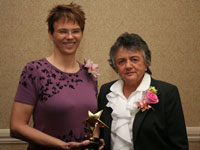
Kathleen Reiley, left, with Chief Justice Abrahamson.
April 1, 2009 – Kathleen Reiley is perplexed by the news that she will receive an award for her service to the
Wisconsin Lawyers Assistance Program (WisLAP).
“There are others who have taken on more work and who have been doing it longer,” Reiley recalled thinking when told of the honor scheduled to be given during the Volunteer Lawyers Recognition Celebration on May 6 at the State Bar Annual Convention in Milwaukee.
But WisLAP coordinator Linda Albert said Reiley excels when called to assist another lawyer reaching out to the program for peer-to-peer counseling for substance addictions, depression, anxiety, and other problems related to the stress of practicing law. “Weekdays or weekends, she is always ready to serve,” Albert said.
Just as importantly, Albert adds, Reiley is fearless in the face of another person’s need. “What Kathy Reiley has done is go directly to the impaired professional and talk with them in their homes or work environment which is extremely difficult to do,” Albert said. “ She has always responded by going to the person of concern, being willing to share her story of recovery -- also very difficult to do and something that most recovering people do not do-for fear of exposure -- and offering hope and resources to the person. Some volunteers might prefer the phone method of support but Kathy has never hesitated to meet with lawyers, take them to an AA meeting and follow up with them. She has also served the committee for several years, served on subcommittees and puts in the extra time.”
But because WisLAP adheres to the strictest rules of confidentiality, neither Reiley nor Albert would elaborate out of concern that even a small detail might identify a client. As such, the award could also be in recognition of Reiley’s outstanding dedication to discretion.
“Attorneys call WisLAP anonymously,” Reiley said. “If they disclose their names, they are still anonymous. WisLAP will not report them to the Office of Lawyer Regulation.”
Reiley, a WisLAP committee member and volunteer, has also been the president of the Dane County Bar Association and a member of the District 9 Committee for the OLR.
Empathy is a great motivator
Reiley explained that every attorney tries to give something back to society in his or her own way. As a recovering alcoholic herself, Reiley said that her contribution is to try to pull talented people away from the ruin of addiction or mental illness.
“Just because someone is dealing with alcoholism, drugs, or depression, doesn’t mean they aren’t wildly creative and smart,” Reiley said.
In addition to her work for WisLAP, Reiley is a guest lecturer at the UW-Madison Law School and has presented to organizations serving battered women and men.
Her experience with recovery does not translate to every individual’s particular struggle, Reiley said. But it has given her an appreciation for the wisdom of asking for help. This is something that can be especially difficult for lawyers to accept because the profession cultivates an image of independent problem solvers. “But drawing on resources is not weakness, it’s sensible,” she said.
On the subject of alcoholism, Reiley is especially adamant on the need for help. “It’s not about a failure of willpower or a personality defect – it is brain chemistry,” Reiley said of the disease. “If you are built to have alcohol metabolize in your body a certain way, you can’t change that with just a strong will.”
When asked where she finds the time to run a solo practice in Madison and make such a substantial commitment to WisLAP, Reiley said that is not so great of an obstacle. “You find the time,” she said. “It just depends on how you want to spend your time.”
Reiley said that this work can be about life and death, noting that she has seen alcohol’s effect on her own family and many others around her. “I’ve seen people – young people – die,” she said.
Also, Reiley said that her WisLAP experience can inform her family law practice. She said that addiction is often the cause for much of the chaos in the lives of her clients. “Often times if you can address the addiction, harmony is restored to the family,” she said.
